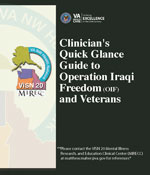MIRECC/CoE Education and Clinical Products
Add your selections to the fields above to search for MIRECC education resources.
Behavioral Family Therapy for Serious Psychiatric Disorders Instructional Set
The DVDs provide comprehensive training in BFT, and the CD provides lecture notes, assessment tools, and all the needed handouts to implement the intervention.
To request access to the training, go to https://mirecc.va.gov/MIRECC/visn22/Behavioral_Family_Therapy_DVD.asp.
MIRECC/COE: VISN 22 MIRECC
Topics: Bipolar Disorder, Schizophrenia, Schizoaffective Disorder, Severe Mental Illness
Audience(s): Healthcare provider
Treatment(s): Behavioral Family Therapy
Cannabis Use in Veterans with Mental Health Conditions: A Brochure for Patients
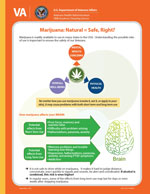
This product is designed to educate patients on cannabis use and how it affects cannabis users with mental health conditions. It is a brochure with detailed information on how cannabis affects user's mental health, physical health, and overall well being. The brochure also offers current information on how cannabis affects various bodily functions and limitations in current research on cannabis use.
MIRECC/COE: CESATE
Topics: Substance Use, Opioid Use
Audience(s): Veteran
Treatment(s): Patient Centered Care
Cannabis Use in Veterans with Mental Health Conditions: An Overview for Providers
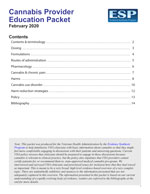
This product is designed to educate and help familiarize VHA clinicians with a high level evidence-based overview on cannabis so that they may feel more comfortable with engaging in discussions with their patients and answering questions regarding cannabis. It includes topics such as dosing, formulations, routes of administration, pharmacology, cannabis and chronic pain, harms, cannabis use disorder, and harm reduction strategies.
MIRECC/COE: CESATE
Topics: Substance Use, Chronic Pain, Pain Management
Audience(s): Health Care Provider
Treatment(s): Patient Centered Care, Screening
Cognitive Training in Severe Mental Illness
This brochure provides information about the different types of cognitive training, the conditions necessary to benefit from it, and how to access this intervention in the community.
To download a copy go to https://www.mirecc.va.gov/visn22/cognitive.asp.
MIRECC/COE: VISN 22 MIRECC
Topics: Bipolar Disorder, Schizophrenia, Severe Mental Illness
Audience(s): Caregiver, Family & Friends, Healthcare Provider, Veteran, Veteran Supporter
Treatment(s): Cognitive Training
Evidence-Based Psychotherapy Shared Decision-Making Toolkit for Mental Health Providers
This toolkit contains information and resources to promote Veterans’ engagement in evidence-based psychotherapies (EBPs) through the use of shared decision-making. Increasingly part of high quality, patient-centered care in other health care contexts, shared decision-making principles and processes provide significant opportunities for promoting initial and ongoing engagement in EBPs. The primary focus of this toolkit is on identifying key components and steps for implementing The Shared Decision-Making (SDM) Session, a pre-treatment intervention for increasing initial engagement in EBPs. Also find sections on promoting ongoing engagement, and practical tools such as brochures, fact sheets and other clinical resources.
MIRECC/COE: VISN 19, Rocky Mountain MIRECC for Suicide Prevention
Topics:
Audience(s): Healthcare Providers
Treatment(s): Patient-Centered Care, Psychotherapy
Gulf War Illness: Explaining Unexplained Symptoms
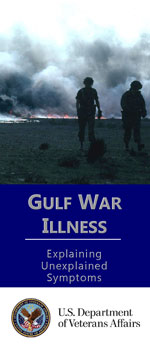
This brochure is designed to aid Veterans who served in the Persian Gulf War between 1990-1991 and their families recognize the symptoms associated with Gulf War Illness. The brochure presents information about causes, symptoms, and treatment of Gulf War Illness, as well as resources to get help within the VA.
MIRECC/COE: VISN 17 Center of Excellence for Research on Returning War Veterans
Topics: Chronic Illness, Chronic Pain
Audience(s): Veteran, Veteran Supporter, Healthcare Provider
Treatment(s): Screening
How to Talk to a Child about a Suicide Attempt in Your Family booklet and DVD
This booklet/DVD supports parents and caregivers challenged with comforting and/or explaining a loved one’s suicide attempt. It addresses four main challenges: demonstrating how speaking with a child about a suicide attempt is necessary and beneficial; providing strategies for supporting three developmental groups (Preschool, School Age, and Teen); offering tools to increase skill and comfort level; and, supplying additional resources. The 24-page booklet provides the basis, addressing critical issues such as mental illness, substance use, and hopelessness, as well as building resiliency and restoring hope. The professionally produced DVD demonstrates these principles in action, and shows how real-life conversations might unfold.
To request a copy, please visit: https://www.mirecc.va.gov/visn19/orderform/orderform.asp
MIRECC/COE: VISN 19, Rocky Mountain MIRECC for Suicide Prevention
Topics: Parenting, Self-Help, Suicide Prevention, Wellness
Audience(s): Caregiver, Family and Friends, Healthcare Provider
Treatment(s): Family Therapy
How to Talk to a Child about a Suicide Attempt in Your Family Website
This Website supports parents and caregivers challenged with comforting and/or explaining a loved one’s suicide attempt. It addresses four main challenges: demonstrating how speaking with a child about a suicide attempt is necessary and beneficial; providing strategies for supporting three developmental groups (Preschool, School Age, and Teen); offering tools to increase skill and comfort level; and, supplying additional resources. The site addresses critical issues such as mental illness, substance use, and hopelessness, as well as building resiliency and restoring hope. Professionally produced videos demonstrate these principles in action, and shows how real-life conversations might unfold.
MIRECC/COE: VISN 19, Rocky Mountain MIRECC for Suicide Prevention
Topics: Parenting, Self-Help, Suicide Prevention, Wellness
Audience(s): Caregiver, Family and Friends, Healthcare Provider
Treatment(s): Family Therapy
HSR&D Spotlight on Suicide Prevention Cyberseminar Series
The purpose of this CE-accredited webinar training series is to provide VA health services and clinical investigators, clinicians, educators, policy makers, and community stakeholders with a forum for communicating practice and policy implications of suicide prevention research and programs for Veterans. Broadly, the SoSP (Spotlight on Suicide Prevention) series is designed to support the National Strategy for Preventing Veteran Suicide by using science to increase our understanding of suicide prevention.
MIRECC/COE: VISN 19, Rocky Mountain MIRECC for Suicide Prevention
Topics: Suicide prevention, Firearms, Lethal means, Military Sexual Trauma, Opioid use, PTSD, Recovery, Rehabilitation, Safety Planning, Sleep Disorders, Stress, Substance use, traumatic brain injury
Audience(s): Community Supporter, Health Care Provider, Family & Friends, Veteran
Treatment(s): ACT, Assessment, Care Transitions, CBT, Patient-centered care, Psychotherapy, Rural care, Screening
Introduction to Pharmacogenetics, brief whiteboard video for patients and providers
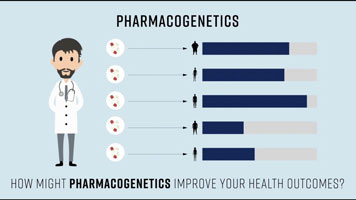
This whiteboard video briefly explains pharmacogenetics, what it is, and how it is being used in health care today. The role of pharmacogenetics in the VA Precision Medicine in Mental Health (PRIME) Care study is described. Running time, 2 minutes and 59 seconds.
This video can be accessed on the VA YouTube Website at: https://youtu.be/X5atvMqPAUY
MIRECC/COE: VISN 04 MIRECC
Topics: Genetics/Genomics, Depression
Audience(s): Veterans, Health Care Providers
Treatment(s): Antidepressants, Medication, Patient-Centered Care
Lethal Means Safety & Suicide Prevention
When it comes to suicide prevention, lethal means safety increases the distance between suicidal thoughts, and action. This online hub provides lethal means facts, information on effective lethal means safety counseling, resources and concrete guidance on helping to keep Veterans safe during high-risk periods. A podcast with Dr. Joe Simonetti guides listeners through the fundamentals of lethal means safety, why it’s important, and provides suggestions on how to ensure that conversations about lethal means safety are Veteran-centered.
MIRECC/COE: VISN 19, Rocky Mountain MIRECC for Suicide Prevention
Topics: Firearms, Lethal Means, Suicide Prevention
Audience(s): Family & Friends, Healthcare Providers, Veterans, Veteran Supporters
Treatment(s): Assessment, Patient-Centered Care, Primary Care, Psychotherapy, Screening
Online TBI Toolkit
Traumatic Brain Injury (TBI) is a significant public health concern. This toolkit provides necessary information to address the needs of individuals with a history of TBI and co-occurring mental health conditions. The toolkit specifically emphasizes TBI in justice-involved and Military/Veteran populations. Community mental health clinicians’, justice-involved professionals’, and Military/Veteran experts’ input was integral in identifying areas of focus. This toolkit is designed to assist professionals in identifying TBI and associated co-occurring problems and to facilitate determining potential need for further evaluation and/or treatment/case planning modification. In addition, relevant information and resources for families/support systems are available.
MIRECC/COE: VISN 19, Rocky Mountain MIRECC for Suicide Prevention
Topics: Alcohol Use Disorder, Criminal Justice, Depression, PTSD, Recovery, Rehabilitation, Substance Use, Suicide Prevention, Traumatic Brain Injury
Audience(s): Family & Friends, Healthcare Providers, Veterans, Veteran Supporters
Treatment(s): Patient-Centered Care, Primary Care, Psychotherapy
Rocky Mountain MIRECC Visual Abstracts
As part of RMIRECC’s goal to make our research accessible to all, we translate our peer-reviewed journal publications into visual abstracts. These visuals highlight key take-aways from our research, presenting information in a condensed, visually compelling way that lets the user decide whether they want to pursue the rest of the story. Visual abstracts are shared on our Twitter account (@RMIRECC) and available as a collection on our Website. We also include a tutorial on the “what and how” of creating your own visual abstracts, including planning, design principles, and nuts and bolts of visual abstract creation.
MIRECC/COE: VISN 19, Rocky Mountain MIRECC for Suicide Prevention
Topics: Aging, Chronic Pain, Depression, Firearms, Genetics/Genomics, Insomnia, Lethal Means, Military Sexual Trauma, Neuroscience, Opiod Use, Pain Management, Peer Support, PTSD, Recovery, Rehabilitation, Safety Planning, Severe Mental Illness, Sleep Disorders, Stigma, Suicide Prevention, Traumatic Brain Injury, Wellness, Whole Health
Audience(s): Active Duty Service Member, Community Supporter, Family & Friends, Healthcare Provider, Older Veteran, Veteran, Veteran Supporter
Treatment(s): ACT, Assessment, Care Transitions, CBT, Integrated Care, Mindfulness, Patient-Centered Care, Primary Care, Psychotherapy, Rural Care, Screening
Self-Directed Violence Classification System and Clinical Toolkit
The field of Suicidology has long struggled with the lack of a universally agreed upon definition for suicide and associated terms. Synonymous with the word suicide is the term self-directed violence. A shared understanding of self-directed violence (SDV) in its various forms is critical. The VA has adopted a system that is consistent with the CDC SELF-DIRECTED VIOLENCE SURVEILLANCE UNIFORM: Definitions and Recommended Data Elements. The SDVCS website contains clinical tools, training, and an interactive set of vignettes to test understanding and knowledge applying SDVCS nomenclature in real world clinical situations.
MIRECC/COE: VISN 19, Rocky Mountain MIRECC for Suicide Prevention
Topics: Suicide Prevention
Audience(s): Healthcare Providers
Treatment(s): Assessment, Care Transitions, Integrated Care, Primary Care, Psychotherapy, Screening
Self-Directed Violence Classification System nomenclature laminates
The field of Suicidology has long struggled with the lack of a universally agreed upon definition for suicide and associated terms. Synonymous with the word suicide is the term self-directed violence. A shared understanding of self-directed violence (SDV) in its various forms is critical. The VA has adopted a system that is consistent with the CDC SELF-DIRECTED VIOLENCE SURVEILLANCE UNIFORM: Definitions and Recommended Data Elements. Two laminates come neatly packaged in a pocket folder, containing the SDCVS definitions, along with the clinical tool, decision-making tree.
To request a copy, please visit: https://www.mirecc.va.gov/visn19/orderform/orderform.asp
MIRECC/COE: VISN 19, Rocky Mountain MIRECC for Suicide Prevention
Topics: Suicide Prevention
Audience(s): Healthcare Providers
Treatment(s): Assessment, Care Transitions, Integrated Care, Primary Care, Psychotherapy, Screening
Sexual Health after Military Sexual Trauma - A Guide for Male Veterans
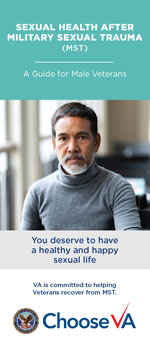
This brochure is designed to aid male Veterans who experienced Military Sexual Trauma understand its impact on sexual health. The brochure presents information about common sexual health dysfunctions in men and how to get help within the VA.
MIRECC/COE: VISN 17 Center of Excellence for Research on Returning War Veterans
Topics: Military Sexual Trauma, Stigma, Wellness, Whole Health
Audience(s): Veteran, Veteran Supporter
Treatment(s):
Sexual Health after Military Sexual Trauma - A Guide for Women Veterans

This brochure is designed to aid women Veterans who experienced Military Sexual Trauma understand its impact on sexual health. The brochure presents information about common sexual health dysfunctions in women and how to get help within the VA.
MIRECC/COE: VISN 17 Center of Excellence for Research on Returning War Veterans
Topics: Military Sexual Trauma, Stigma, Wellness, Whole Health, Women
Audience(s): Veteran, Veteran Supporter
Treatment(s):
Sexual Health after Military Sexual Trauma - Clinician Guide

This brochure is designed to aid healthcare providers in treating female Veterans who have sexual dysfunction. The brochure addresses information about common sexual health dysfunctions in women, its connection to Military Sexual Trauma, how to approach the topic with female Veterans, and provides resources for treatment and specialty care of sexual dysfunction.
MIRECC/COE: VISN 17 Center of Excellence for Research on Returning War Veterans
Topics: Military Sexual Trauma, Stigma, Wellness, Whole Health
Audience(s): Health Care Provider
Treatment(s): Screening
Sexual Health after Military Sexual Trauma - Patient Guide

This brochure is designed to aid female Veterans who experienced Military Sexual Trauma understand its impact on sexual health. The brochure presents information about common sexual health dysfunctions in women and how to get help within the VA.
MIRECC/COE: VISN 17 Center of Excellence for Research on Returning War Veterans
Topics: Military Sexual Trauma, Stigma, Wellness, Whole Health
Audience(s): Veteran, Veteran Supporter
Treatment(s):
Short Takes on Suicide Prevention Podcast series
Rocky Mountain MIRECC for Suicide Prevention hosts a serial podcast called Short Takes on Suicide Prevention. We interview leaders in the field of suicide prevention in an attempt to make their research accessible to everyone. Topic areas include lethal means safety, research and clinical applications, Veteran and community partners and others. Listeners may subscribe via iTunes for iPhone, or on an Android device.
MIRECC/COE: VISN 19, Rocky Mountain MIRECC for Suicide Prevention
Topics: Alcohol Use Disorder, Chronic Pain, Criminal Justice, Depression, Firearms, Insomnia, Lethal Means, Military Sexual Trauma, Neuroscience, Rehabilitation, Safety Planning, Self-Help, Severe Mental Illness, Skill Management, Sleep Disorders, Stigma, Substance Use, Suicide Prevention, Trauma Related Disorders, Traumatic Brain Injury, Wellness, Whole Health
Audience(s): Active Duty Service Member, Community Supporter, Family & Friends, Healthcare Provider, Older Veteran, Veteran, Veteran Supporter
Treatment(s): ACT, Assessment, Care Transitions, CBT, Integrated Care, Mindfulness, Patient-Centered Care, Primary Care, Psychotherapy, Rural Care, Screening
Substance Use and Traumatic Brain Injury Risk Reduction and Prevention DVD
This seven-minute program provides information regarding the impact of using drugs and alcohol after a traumatic brain injury (TBI). The DVD guides the viewer through a discussion about how the brain works before and after a brain injury, and then demonstrates how drugs and alcohol can affect persons with a history of TBI using brain animations and short vignettes. This tool was designed to facilitate providers in engaging clients in a dialogue about substance use post-injury. It may also be viewed by clients alone, in addition to professional treatment.
To request a copy, please visit: https://www.mirecc.va.gov/visn19/orderform/orderform.asp
MIRECC/COE: VISN 19, Rocky Mountain MIRECC for Suicide Prevention
Topics: Alcohol Use Disorder, Recovery, Rehabilitation, Suicide Prevention, Traumatic Brain Injury
Audience(s): Active Duty Service Members, Family and Friends, Health Care Provider, Older Veteran, Veteran
Treatment(s): Psychotherapy
Substance Use and Traumatic Brain Injury Risk Reduction and Prevention video
This seven-minute program provides information regarding the impact of using drugs and alcohol after a traumatic brain injury (TBI). The video guides the viewer through a discussion about how the brain works before and after a brain injury, and then demonstrates how drugs and alcohol can affect persons with a history of TBI using brain animations and short vignettes. This tool was designed to facilitate providers in engaging clients in a dialogue about substance use post-injury. It may also be viewed by clients alone, in addition to professional treatment.
MIRECC/COE: VISN 19, Rocky Mountain MIRECC for Suicide Prevention
Topics: Alcohol Use Disorder, Recovery, Rehabilitation, Suicide Prevention, Traumatic Brain Injury
Audience(s): Active Duty Service Members, Family and Friends, Health Care Provider, Older Veteran, Veteran
Treatment(s): Psychotherapy
Therapeutic Risk Management laminates
The Rocky Mountain MIRECC model of Therapeutic Risk Management of the Suicidal Patient is a clinically and medicolegally informed model for the assessment and management of suicide risk. It involves three main components: Augmentation of clinical risk assessment with structured instruments; Risk stratification with respect to both severity and temporality; and Collaborative development of a safety plan. The Risk Stratification Table is a tool designed to: help providers make determinations regarding suicide risk levels with respect to severity and temporality; and to aid in suicide risk management clinical decision making.
Access a laminated version of the tool here: https://www.mirecc.va.gov/visn19/orderform/orderform.asp
MIRECC/COE: VISN 19, Rocky Mountain MIRECC for Suicide Prevention
Topics: Suicide Prevention
Audience(s): Healthcare Providers
Treatment(s): Assessment, Care Transitions, Integrated Care, Primary Care, Psychotherapy, Screening
Therapeutic Risk Management of the Suicidal Patient Website
The Rocky Mountain MIRECC model of Therapeutic Risk Management of the Suicidal Patient is a clinically and medicolegally informed model for the assessment and management of suicide risk. It involves three main components: Augmentation of clinical risk assessment with structured instruments; Risk stratification with respect to both severity and temporality; and Collaborative development of a safety plan. These comprehensive Web pages provide information about the therapeutic risk management approach, the clinical tool, presentations, and resources for implementing TRM into practice.
MIRECC/COE: VISN 19, Rocky Mountain MIRECC for Suicide Prevention
Topics: Suicide Prevention
Audience(s): Healthcare Providers
Treatment(s): Assessment, Care Transitions, Integrated Care, Primary Care, Psychotherapy, Screening
Treating Sexual Dysfunction in Male Veterans - Clinician Guide
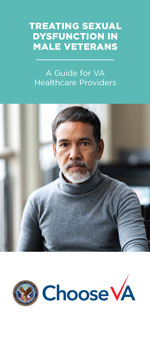
This brochure is designed to aid healthcare providers in treating male Veterans who have sexual dysfunction. The brochure addresses information about common sexual health dysfunctions in men, its connection to Military Sexual Trauma, how to approach the topic with male Veterans, and provides resources for treatment of sexual dysfunction.
MIRECC/COE: VISN 17 Center of Excellence for Research on Returning War Veterans
Topics: Military Sexual Trauma, Stigma, Wellness, Whole Health
Audience(s): Health Care Provider
Treatment(s): Screening
Treating Sexual Dysfunction in Women Veterans - Clinician Guide

This brochure is designed to aid healthcare providers in treating women Veterans who have sexual dysfunction. The brochure addresses information about common sexual health dysfunctions in women, its connection to Military Sexual Trauma, how to approach the topic with women Veterans, and provides resources for treatment of sexual dysfunction.
MIRECC/COE: VISN 17 Center of Excellence for Research on Returning War Veterans
Topics: Military Sexual Trauma, Stigma, Wellness, Whole Health, Women
Audience(s): Health Care Provider
Treatment(s): Screening
Treatment Works for Veterans
TreatmentWorksforVets.org is a fun, interactive learning Website that introduces Veterans to EBPs (Evidence-Based Psychotherapies), proven mental health treatments. Veterans choose their own path to explore topics such as insomnia, depression and suicidal thoughts, alcohol and drugs, managing chronic pain and relationship distress. For Veterans who are interested in a particular EBP, the “Find Treatment” options offer support for locating qualified, trained providers either within VHA or in local communities.
MIRECC/COE: VISN 19, Rocky Mountain MIRECC for Suicide Prevention
Topics: Alcohol Use Disorder, Chronic Pain, Depression, Insomnia, Pain Management, PTSD, Recovery, Self-Help, Sleep Disorders, Stress, Substance Use, Suicide Prevention, Wellness
Audience(s): Active Duty Service Member, Older Veteran, Veteran
Treatment(s): ACT, CBT, Psychotherapy
Uniting for Suicide Postvention Online Hub
Suicide prevention is a commonly used and understood term. However not everyone recognizes suicide postvention. Suicide postvention builds upon prevention efforts by providing immediate and ongoing support to those impacted by a suicide loss.
Postvention is critical for healing after suicide. Uniting for Suicide Postvention (USPV) provides resources and support for everyone touched by suicide loss. To learn more, visit the online, interactive hub, with sections for the community, workplace and providers.
MIRECC/COE: VISN 19, Rocky Mountain MIRECC for Suicide Prevention
Topics: Self-Help, Suicide Prevention, Wellness, Whole Health
Audience(s): Active Duty Service Member, Community Supporter, Family & Friends, Healthcare Provider, Older Veteran, Veteran, Veteran Supporter
Treatment(s): N/A
What are Panic Disorder and Agoraphobia?
This brochure covers basic facts about panic disorder and agoraphobia including prevalence, diagnosis, symptoms, medication, how family members can help and treatments available.
To download a copy go to https://mirecc.va.gov/MIRECC/visn22/Panic_and_Agoraphobia.asp.
To request a hard copy email noosha.niv@va.gov.
MIRECC/COE: VISN 22 MIRECC
Topics: Anxiety
Audience(s): Caregiver, Family & Friends, Healthcare Provider, Veteran, Veteran Supporter
Treatment(s): Medication, Cognitive Behavioral Therapy (CBT), Relaxation, Training, Mindfulness and Acceptance Practices, Antidepressant Medication, Benzodiazepines, Anticonvulsant, Medications
What are Panic Disorder and Agoraphobia? (Spanish)
This brochure is in Spanish. It covers basic facts about panic disorder and agoraphobia including prevalence, diagnosis, symptoms, medication, how family members can help and treatments available.
To download a copy go to https://mirecc.va.gov/MIRECC/visn22/Panico_Agorafobia.asp
MIRECC/COE: VISN 22 MIRECC
Topics: Anxiety
Audience(s): Caregiver, Family & Friends, Healthcare Provider, Veteran, Veteran Supporter
Treatment(s): Medication, Cognitive Behavioral Therapy (CBT), Relaxation Training, Mindfulness and Acceptance Practices, Antidepressant Medication, Benzodiazepines, Anticonvulsant Medications
What is Generalized Anxiety Disorder?
This brochure covers basic facts about generalized anxiety disorder including prevalence, diagnosis, symptoms, medication, how family members can help and treatments available.
To download a copy go to https://mirecc.va.gov/MIRECC/visn22/Generalized_Anxiety_Disorder.asp.
To request a hard copy email noosha.niv@va.gov.
MIRECC/COE: VISN 22 MIRECC
Topics: Anxiety
Audience(s): Caregiver, Family & Friends, Healthcare Provider, Veteran, Veteran Supporter
Treatment(s): Medication, Cognitive Behavioral Therapy (CBT), Relaxation Training, Mindfulness and Acceptance Practices, Acceptance and Commitment, Cognitive Behavioral Therapy for Insomnia (CBT-I), Antidepressant Medication
What is Major Depression?
This brochure covers basic facts about depression including prevalence, diagnosis, symptoms, medication, how family members can help and treatments available.
To download a copy go to https://mirecc.va.gov/MIRECC/visn22/Major_Depression.asp.
To request a hard copy email noosha.niv@va.gov.
MIRECC/COE: VISN 22 MIRECC
Topics: Depression
Audience(s): Caregiver, Family & Friends, Healthcare Provider, Veteran, Veteran Supporter
Treatment(s): Medication, Cognitive Behavioral Therapy (CBT), Family Psychoeducation, Assertive Community Treatment (ACT), Electroconvulsive Therapy (ECT), Antidepressant Medication
What is Obsessive-Compulsive Disorder?
This brochure covers basic facts about obsessive-compulsive disorder including prevalence, diagnosis, symptoms, medication, how family members can help and treatments available.
To download a copy go to https://mirecc.va.gov/MIRECC/visn22/Obsessive_Compulsive_Disorder.asp.
To request a hard copy email noosha.niv@va.gov.
MIRECC/COE: VISN 22 MIRECC
Topics: Anxiety, OCD
Audience(s): Caregiver, Family & Friends, Healthcare Provider, Veteran, Veteran Supporter
Treatment(s): Medication, Cognitive Behavioral Therapy (CBT), Acceptance and Commitment Therapy, Antidepressant Medication, Antipsychotic Medication
What is Obsessive-Compulsive Disorder? (Spanish)
This brochure is in Spanish. It covers basic facts about obsessive-compulsive disorder including prevalence, diagnosis, symptoms, medication, how family members can help and treatments available.
To download a copy go to https://mirecc.va.gov/MIRECC/visn22/Trastorno_Obsesivo_Compulsivo.asp
MIRECC/COE: VISN 22 MIRECC
Topics: Anxiety OCD
Audience(s): Caregiver, Family & Friends, Healthcare Provider, Veteran, Veteran Supporter
Treatment(s): Medication, Cognitive Behavioral Therapy (CBT), Acceptance and Commitment Therapy, Antidepressant Medication, Antipsychotic Medication













